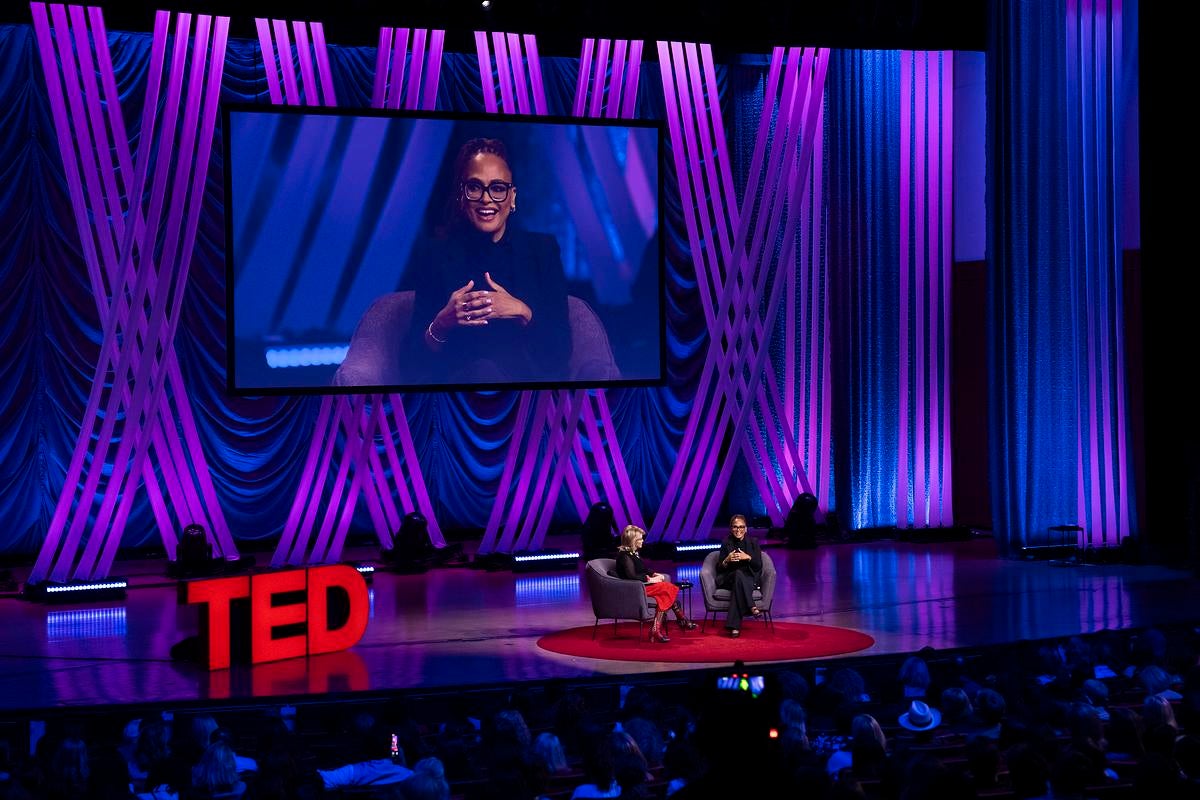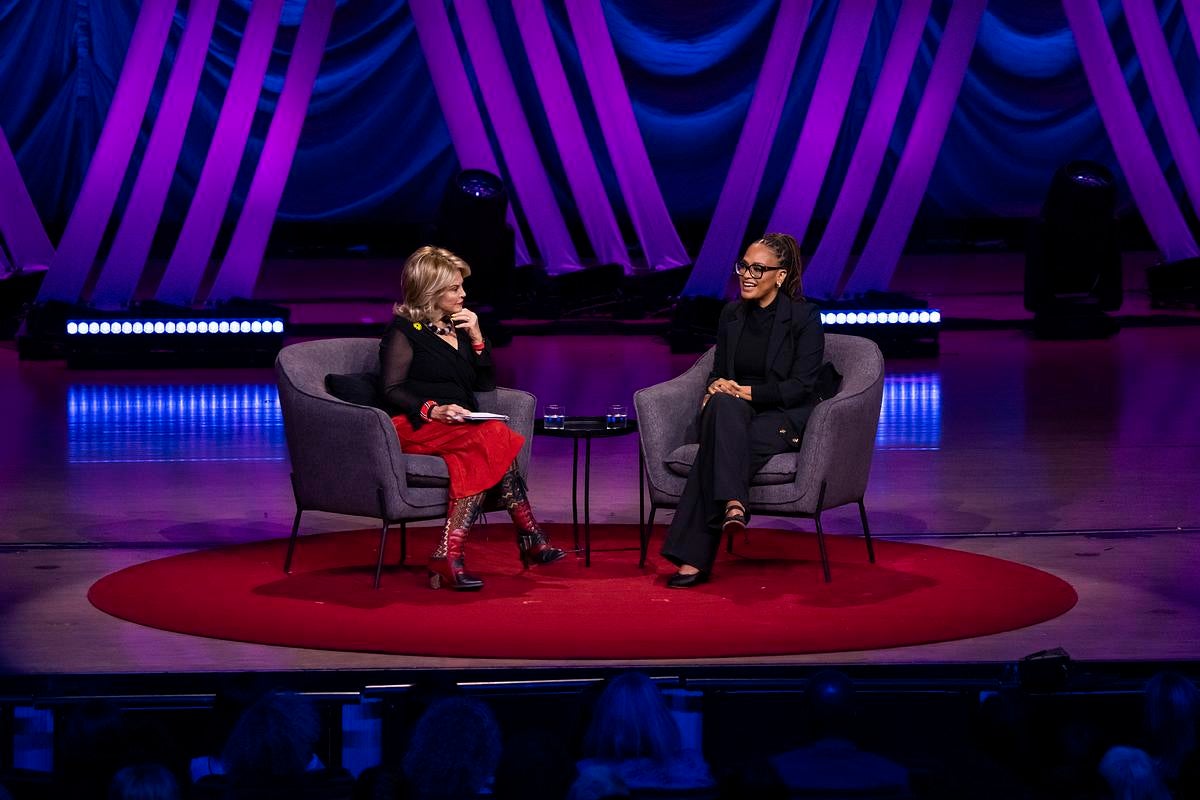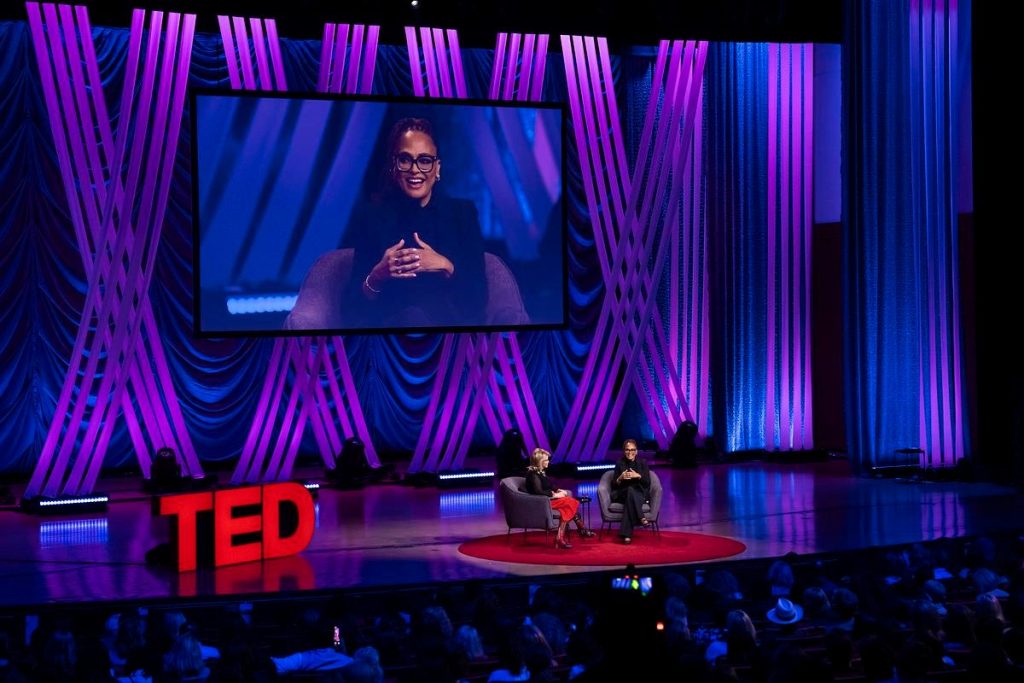
Award-winning director Ava DuVernay recently joined dozens of thought leaders and luminaries at TEDWomen 2023: Two Steps Forward in in Atlanta, where conversations about gender equity and pressing issues like democracy, climate change, human rights, artificial intelligence, and more took center stage.
This October marked the 13th year of the event, highlighting women leaders across industries, but this is the first time the event took place in the south, as approximately 1,200 people from 49 countries made their way to Georgia for the three-day event — the largest TEDWomen audience ever, according to organizers.
On day one, DuVernay spoke about her trailblazing work creating access and opportunities for more women and people of color in the entertainment industry, and her latest film, “Origin” — set to have a limited theatrical release in December of this year before its full rollout in January 2024.

DuVernay’s conversation with TEDWomen co-founder and editorial director Pat Mitchell comes just one month after she made history as the first Black woman to have a film compete for the Golden Lion prize in the Venice Film Festival’s 80-year history.
The acclaimed filmmaker, writer, and producer pulled from Isabel Wilkerson’s New York Times bestselling book, “Caste,” and the author’s life to tell the story that is “Origin,” which stars Aunjanue Ellis as Wilkerson herself. She also raised independent financing to make the film. “That’s why Aunjanue Ellis’s involvement is so extraordinary. She had just come off the Academy Award nomination for ‘King Richard’ and could have really done anything,” she told Mitchell.
The film, made in 37 days and on three continents, shows the parallels between events in Wilkerson’s life and various historical moments where lower-caste people have been dehumanized and mistreated — from Nazi Germany to the Jim Crow South. “This film was the first time I felt like I got in a groove — out of everything that I’ve made. Those two things, her life and the historical context of Caste, somehow fit together,” said DuVernay.
From “Selma” and “13th” to “When They See Us” and now, “Origin,” DuVernay continues to create work that reveals stories untold and under-told and presents information in ways that will resonate with audiences.
When asked about that part of her work, she explained, “I’m really just making what I’m interested in and what I’ve learned.” She went on to say, “When I learned the information [presented in] ’13th,’ I wanted to share it. When I understood what was happening with Black farmers in this country, I wanted to make ‘Queen Sugar.’ I’m a ferocious reader who will then go make a movie about it. It’s a beautiful way to further our knowledge because images embed themselves. I believe images embed themselves in our imagination in a way that words alone don’t. We think in pictures — your memories are pictures. To be able to approximate that, to render that on film, is such an honor.”
TED stands for technology, entertainment, and design. Although DuVernay is known for her work in the entertainment industry, technology and design both play a part in her work, creating access for Black talent behind the scenes. She spoke about some of the work that her independent distribution company, ARRAY, is doing, such as its ARRAY Creative Campus, a state-of-the-art facility for production development.
When asked why it’s been so important for her to open doors for others and bring them along as she grows, the acclaimed filmmaker said: “We congregate around ideas and images, but it’s really community. I found that it’s just boring by yourself.”
Additionally, in 2021, DuVernay’s company launched an innovative and game-changing database called ARRAY Crew. “ARRAY Crew is a database so that people of color, women, and people who are kind of aged out of our industry and are no longer called for crew jobs — are all in a database,” she explained. “All of the people that are ‘outside of the box,’ you can find them, and you can hire them. On ‘Queen Sugar,’ we hired all women directors for seven seasons. I’m just finding ways to have good people around, and it’s really as simple as that.”
In August, it was announced that DuVernay’s ARRAY Crew was joining forces with Impact, a professional network for the entertainment industry, to create the industry’s largest hiring network.
From her work on screen to her work off-screen, it’s all a testament to finding what she refers to as her “liberated territory. “
“[Haile] Gerima — an extraordinary Ethiopian-born filmmaker who studied at UCLA, went on to be a professor of film and art at Howard University for many years, and has a small bookstore and cafe called Sankofa, named after his film ‘Sankofa’ — he has this idea that in order to thrive, not just as an artist, but as a person, you must find and claim your liberated territory,” she said.
That idea was part of what inspired the creation of the ARRAY Creative Campus, but DuVernay explained that liberated territory, a place where you feel most courageous, doesn’t have to be a physical space. “It needs to be the space that you can go to, inside yourself. That is your safe place where you allow yourself to be able to ideate, have bad ideas, talk yourself into ideas, talk yourself out of that idea, and just cultivate within yourself,” she said. “For me, it wasn’t just the physical space.It was also freeing my mind and freeing up spaces within me where I said, ‘This is my liberated territory.’.. You have to create the right conditions. My hope is that I found mine in film. And the hope is that we can all find ours in whatever ways we’re able to.”
